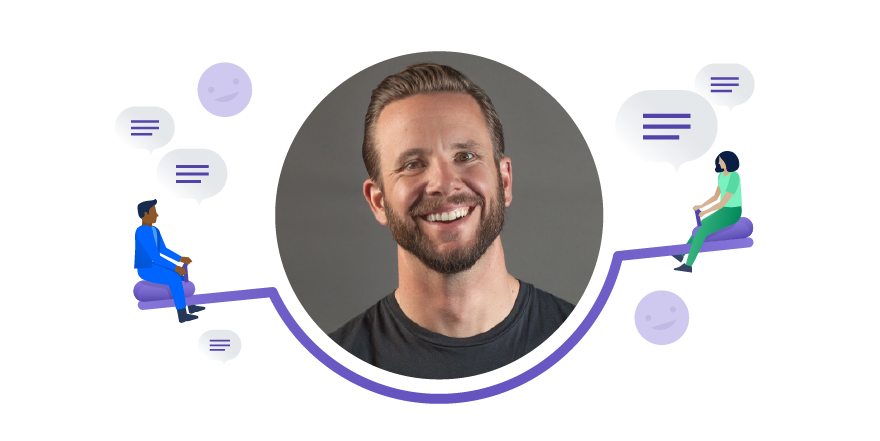Ryan Vanni is the CEO of Bukwild, an award-winning digital ad agency in Sacramento. He started his company at just 21 and didn’t have an understanding of the trends in business or what company culture really was. He’s quick to admit he had no idea what he was doing for most of the time.
Since launching in 2001, they’ve worked with clients amongst the likes of Amazon, Netflix, and Pandora. They just claimed a people’s choice Webby award for their work on Coachella’s website.
Vanni works particularly hard to craft the culture of Bukwild. He strives for a place where employees can be themselves at work, do good work, and take time to go on adventures and be with their families. As a father of four, Vanni recognizes the importance of family time.
As part of our Culture Changers series, we sat down with Vanni to see how he built the culture of Bukwild to balance the wants and needs of his employees and the demands of a high performing advertising agency.
How do you describe Bukwild’s culture?
We are a very transparent, familial. We work to live, we do not live to work. We strive for excellence while viewing ourselves right-sized. It’s easy in our professional careers—in my estimation, at least—to think that we’re doing more or accomplishing more than we really are and lose track of your values.
What do you mean by “right-sized?”
Right-sized-ness is viewing the importance of our work relative to the balance we need in life. It’s so easy to fall into self-importance. Often the things I desire for a culture are in direct opposition to each other.
For example, I mentioned we’re a work-to-live culture, so we have uncapped paid time off. This means we have people traveling constantly, and that comes at a cost. But to have our own adventures in our own lives pays dividends in the culture we keep. But we have great work we need to accomplish.
Balance is the key…a scale or a teeter-totter, two opposing things hoping to be at an equal weight.
A lot of people are talking about balance right now because it’s a millennial value. When in actuality “balance” is a human value. Millennials just happen to be the generation to question so boldly the absurd standards we’ve become accustomed to.
They’ve hired companies like us to find out millennials care about balance. So they allow you to bring your dog to work or have a happy hour or something.

But that’s not real balance. How do you be a company in a capitalist environment while balancing the actual lives of the people who work for you?
That’s my job. To try and find all those things that will equal the same weight on the teeter-totter.
What levers have you pulled to balance the teeter-totter?
Well, the uncapped paid time off, we’ve offered it since 2010.
Another local business owner told me it would backfire. But only one person has ever abused it, and we let that person go. We encourage you to go be with your family and take your adventures. When work needs to get done, we just figure it out. People take time off and we work around it.
One way we handle all the time off is that our work isn’t silo-ed. There’s a democratic way we get things done. It doesn’t have to go through one person, it’s a shared responsibility.
You started your company at age 21, what got you interested in building a transparent company culture?
I don’t read a lot. I specifically don’t read a lot about what other companies do, it clouds my judgment. I want to come from a very earnest place. I spend time listening to my own intuition and writing about it and thinking about how this value can materialize in a reasonable way. The whole authenticity thing, I am by my very nature a transparent person. I am uncomfortable in small talk.
How have you cultivated authenticity at Bukwild?
“Bring your whole self to work” is part of our vision statement, it’s in our manifesto. We’ll do great work by giving people space and time to be themselves. In a small group, culture is set by the leader.
For example, alcoholism. I went to rehab.
My whole team knows this. It’s as much a heavy subject as it is a joking subject. We have a lot of alcohol clients, and it comes up as an ironic joke. But, as soon as I became comfortable sharing my struggle, which was about a year in, it opened up doors for other people to share. Some incredible things have happened because I go to work as me. I don’t go to work as the boss.
The old school mentality would say, “Keep that shit to yourself. Of course, you don’t bring it to work.” But it’s in everybody’s lives. Everybody has some strife and struggles with something. Bringing your full self to work doesn’t require you to word vomit all your stuff. But if you want to share, we won’t shun you.

What lessons have you learned about culture building in the 17 years you’ve been running your own agency?
It’s a lot harder than it looks.
I think it takes constant mining and gardening. Last year, I took six weeks off. Before I took off, I sat down with each employee and asked for input. I got all kinds of critical feedback—good but critical.
The biggest lesson was I need to have a constant dialogue with every employee. One is not enough.
The initial sit down was so helpful that we did another a couple months later, and we’re planning on doing them twice a year.
Between the first and second sit down did you see a culture shift?
Absolutely! I got great feedback, and we put that into action. There’s a tremendous amount of work, and we haven’t put all the stuff into action.
I realized directors were making decisions without looping in the rest of the teammates. The farther down the org chart you go, the more insight you have. So now we have Agency Alignment meetings (or AA meetings) and happy hour (yes, like I said, it’s a running joke about a heavy subject). These meetings are opportunities to share what we’re thinking at the director level and get feedback. It’s a full group discussion, it’s casual, and you can say whatever.

What would you do differently?
I have allowed fear to become a part of my operating system…We’ve spent too much time being all things to lots of groups and not enough time being very convicted about what our value is and who we shouldn’t be working with.
I’m still working on how to work out of intuition and inspiration and keep fear out of my business. You could write books and books and books about that, but I wouldn’t read them anyway.







































